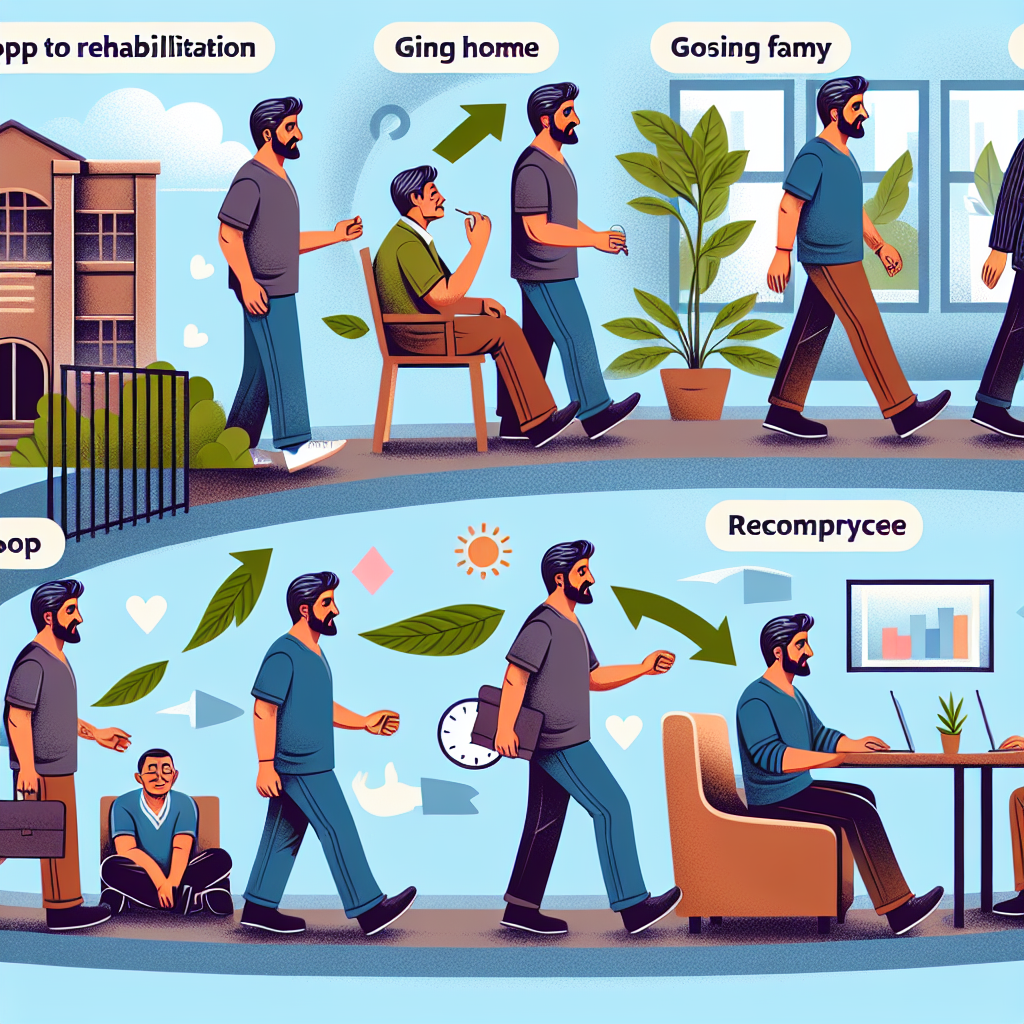-
Table of Contents
“Empower Your Future: Sustainable Strategies for Overcoming Cocaine Addiction”
Introduction
Cocaine addiction is a pervasive and destructive condition that affects millions of individuals worldwide. Long-term recovery from this powerful stimulant requires a multifaceted approach that addresses the physical, psychological, and social aspects of addiction. Effective strategies for long-term recovery include comprehensive treatment programs, behavioral therapies, support groups, lifestyle changes, and ongoing aftercare. These strategies aim to help individuals not only achieve sobriety but also maintain it by fostering resilience, promoting healthy coping mechanisms, and rebuilding a fulfilling life free from substance dependence. By understanding and implementing these strategies, individuals can navigate the challenging journey of recovery and work towards sustained well-being and personal growth.
Developing a Strong Support Network
Developing a strong support network is a crucial strategy for long-term recovery from cocaine addiction. The journey to sobriety is often fraught with challenges, and having a reliable support system can make a significant difference in overcoming these obstacles. One of the first steps in building this network is to identify individuals who genuinely care about your well-being and are willing to support you through thick and thin. These can be family members, close friends, or even colleagues who understand the gravity of your situation and are committed to helping you stay on the path to recovery.
In addition to personal connections, joining support groups can provide an invaluable sense of community and shared experience. Groups such as Narcotics Anonymous (NA) offer a safe space where individuals can share their struggles and triumphs with others who have faced similar challenges. The sense of camaraderie and mutual understanding in these groups can be incredibly empowering, helping you realize that you are not alone in your journey. Moreover, the structured nature of these meetings can provide a sense of routine and accountability, which are essential components of long-term recovery.
Professional support is another critical element in developing a robust support network. Therapists and counselors who specialize in addiction can offer tailored strategies and coping mechanisms to help you navigate the complexities of recovery. Cognitive-behavioral therapy (CBT), for instance, can be particularly effective in identifying and changing the thought patterns that contribute to addictive behaviors. Regular sessions with a qualified therapist can provide a safe space to explore underlying issues and develop healthier ways of coping with stress and triggers.
Furthermore, medical professionals can play a vital role in your recovery journey. Regular check-ups with a healthcare provider can help monitor your physical health, which is often compromised by prolonged cocaine use. In some cases, medication may be prescribed to manage withdrawal symptoms or co-occurring mental health conditions such as depression or anxiety. Having a medical professional as part of your support network ensures that you are receiving comprehensive care that addresses both your physical and mental health needs.
While external support is crucial, it is equally important to cultivate self-reliance and resilience. Developing healthy habits such as regular exercise, a balanced diet, and adequate sleep can significantly improve your overall well-being and make it easier to resist the temptation to relapse. Mindfulness practices such as meditation and yoga can also help you stay grounded and focused on your recovery goals. These practices not only enhance your physical health but also contribute to emotional stability, making it easier to cope with stress and cravings.
In addition to these strategies, setting realistic and achievable goals can provide a sense of direction and purpose. Whether it’s pursuing a new hobby, furthering your education, or advancing in your career, having something to strive for can keep you motivated and focused on the future. Celebrating small milestones along the way can also boost your confidence and reinforce your commitment to staying sober.
Ultimately, developing a strong support network is about creating a balanced and holistic approach to recovery. By combining personal connections, professional guidance, and self-care practices, you can build a solid foundation for long-term sobriety. Remember, recovery is not a destination but a continuous journey, and having a reliable support system can make all the difference in navigating this path successfully. With determination, resilience, and the right support, long-term recovery from cocaine addiction is not only possible but entirely within your reach.
Implementing Healthy Lifestyle Changes
Implementing healthy lifestyle changes is a cornerstone of long-term recovery from cocaine addiction. The journey to sobriety is not merely about abstaining from drug use; it involves a holistic transformation that encompasses physical, mental, and emotional well-being. By adopting a healthier lifestyle, individuals can build a strong foundation for sustained recovery and a more fulfilling life.
One of the first steps in implementing healthy lifestyle changes is to establish a balanced and nutritious diet. Proper nutrition plays a crucial role in healing the body and mind from the ravages of addiction. Cocaine use often leads to poor eating habits and nutritional deficiencies, which can exacerbate feelings of fatigue, depression, and anxiety. By incorporating a variety of fruits, vegetables, lean proteins, and whole grains into their diet, individuals can restore their physical health and improve their mood and energy levels. Additionally, staying hydrated by drinking plenty of water is essential for overall well-being.
Regular physical activity is another vital component of a healthy lifestyle that can significantly aid in recovery. Exercise has been shown to reduce stress, improve mood, and increase self-esteem, all of which are beneficial for individuals in recovery. Engaging in activities such as walking, running, yoga, or swimming can help to release endorphins, the body’s natural “feel-good” chemicals, which can counteract the cravings and negative emotions associated with withdrawal. Moreover, exercise can provide a sense of routine and purpose, helping individuals to stay focused on their recovery goals.
In addition to physical health, mental and emotional well-being are equally important in the recovery process. Practicing mindfulness and meditation can be powerful tools for managing stress and maintaining emotional balance. These practices encourage individuals to stay present in the moment and develop a greater awareness of their thoughts and feelings. By cultivating mindfulness, individuals can learn to respond to triggers and cravings with greater resilience and self-control. Furthermore, engaging in creative activities such as art, music, or writing can provide a therapeutic outlet for expressing emotions and processing experiences.
Building a strong support network is also essential for long-term recovery. Surrounding oneself with positive influences and supportive individuals can make a significant difference in maintaining sobriety. This support can come from family, friends, support groups, or professional counselors. Participating in group therapy or 12-step programs can offer a sense of community and shared understanding, which can be incredibly comforting and motivating. Additionally, having a sponsor or mentor who has successfully navigated their own recovery journey can provide valuable guidance and encouragement.
Establishing a structured daily routine can further reinforce healthy lifestyle changes. A consistent schedule can help individuals to stay organized, reduce stress, and create a sense of stability. This routine might include regular meal times, exercise, work or school commitments, and time for relaxation and hobbies. By filling their days with meaningful and productive activities, individuals can reduce the likelihood of boredom or idle time, which can be triggers for relapse.
Lastly, setting realistic and achievable goals is crucial for maintaining motivation and a sense of progress. These goals can be related to various aspects of life, such as personal development, career aspirations, or relationships. Celebrating small victories along the way can boost confidence and reinforce the commitment to recovery.
In conclusion, implementing healthy lifestyle changes is a multifaceted approach that addresses the physical, mental, and emotional aspects of recovery from cocaine addiction. By focusing on nutrition, exercise, mindfulness, support networks, structured routines, and goal-setting, individuals can create a robust framework for long-term sobriety and a more fulfilling life. The journey may be challenging, but with determination and the right strategies, lasting recovery is within reach.
Utilizing Cognitive Behavioral Therapy
Cognitive Behavioral Therapy (CBT) has emerged as a cornerstone in the treatment of cocaine addiction, offering a structured and effective approach to long-term recovery. This therapeutic method focuses on identifying and changing negative thought patterns and behaviors that contribute to substance abuse. By understanding the underlying psychological triggers, individuals can develop healthier coping mechanisms and build a foundation for sustained sobriety.
One of the primary benefits of CBT is its emphasis on self-awareness. Through guided sessions, individuals learn to recognize the thoughts and situations that lead to cravings and drug use. This heightened awareness is crucial, as it allows for the early identification of potential relapse triggers. For instance, a person might discover that stress at work or social gatherings where drugs are present are significant triggers. By pinpointing these situations, they can develop strategies to avoid or manage them effectively.
Moreover, CBT equips individuals with practical skills to handle these triggers. Techniques such as cognitive restructuring help in challenging and changing irrational beliefs that often lead to drug use. For example, someone might believe that they need cocaine to socialize or feel confident. Through CBT, they can learn to replace this belief with healthier alternatives, such as engaging in social activities that do not involve substance use or practicing mindfulness to boost self-esteem.
In addition to cognitive restructuring, behavioral interventions play a vital role in CBT. These interventions often involve setting realistic goals and developing a plan to achieve them. For example, an individual might set a goal to reduce their exposure to environments where cocaine is present. They can then work with their therapist to create a step-by-step plan, which might include finding new social circles, engaging in hobbies, or attending support groups. By breaking down these goals into manageable steps, individuals can gradually build a lifestyle that supports their recovery.
Another critical aspect of CBT is the development of problem-solving skills. Addiction often stems from an inability to cope with life’s challenges. CBT teaches individuals how to approach problems systematically, considering various solutions and their potential outcomes. This proactive approach not only helps in managing immediate issues but also builds resilience, making it easier to handle future challenges without resorting to drug use.
Furthermore, CBT encourages the practice of self-compassion and forgiveness. Recovery is a journey, and setbacks are a natural part of the process. By fostering a compassionate mindset, individuals can view relapses as opportunities for growth rather than failures. This perspective shift is essential for maintaining motivation and perseverance in the face of difficulties.
Incorporating CBT into a comprehensive treatment plan can significantly enhance the chances of long-term recovery from cocaine addiction. However, it is important to remember that CBT is most effective when combined with other support systems, such as group therapy, family counseling, and medical interventions. A holistic approach ensures that all aspects of an individual’s life are addressed, providing a robust support network that fosters lasting change.
Ultimately, the journey to recovery is deeply personal and requires a commitment to change. By utilizing Cognitive Behavioral Therapy, individuals can gain the tools and insights needed to overcome addiction and build a fulfilling, drug-free life. The path may be challenging, but with determination and the right support, long-term recovery is not only possible but within reach.
Establishing Relapse Prevention Techniques
Establishing relapse prevention techniques is a crucial component of long-term recovery from cocaine addiction. The journey to sobriety is often fraught with challenges, but with the right strategies, individuals can build a resilient foundation to maintain their recovery. One of the first steps in this process is understanding the triggers that lead to cocaine use. Triggers can be internal, such as stress or emotional pain, or external, like certain people, places, or situations. By identifying these triggers, individuals can develop coping mechanisms to manage them effectively.
Mindfulness and stress management techniques play a significant role in relapse prevention. Practices such as meditation, yoga, and deep-breathing exercises can help individuals stay grounded and reduce the anxiety that often accompanies cravings. These techniques not only provide immediate relief but also contribute to long-term emotional stability. Additionally, engaging in regular physical activity can be incredibly beneficial. Exercise releases endorphins, which are natural mood lifters, and can serve as a healthy outlet for stress and frustration.
Another essential strategy is building a strong support network. Surrounding oneself with supportive friends, family, and peers who understand the challenges of addiction can provide a sense of community and accountability. Support groups, such as Narcotics Anonymous, offer a safe space to share experiences and gain insights from others who have faced similar struggles. These groups can be a source of inspiration and encouragement, reminding individuals that they are not alone in their journey.
Developing a structured daily routine is also vital for relapse prevention. A consistent schedule can provide a sense of normalcy and purpose, reducing the likelihood of falling back into old habits. This routine should include time for self-care, work or school, hobbies, and social activities. By keeping busy and engaged in meaningful activities, individuals can reduce the temptation to use cocaine as a way to fill a void.
Therapy and counseling are indispensable tools in the recovery process. Cognitive-behavioral therapy (CBT), in particular, has been shown to be effective in helping individuals change negative thought patterns and behaviors associated with addiction. Through therapy, individuals can explore the underlying issues that contributed to their cocaine use and develop healthier ways to cope with life’s challenges. Therapy also provides a safe space to discuss setbacks and develop strategies to overcome them.
In addition to these strategies, it is important to set realistic goals and celebrate small victories along the way. Recovery is a gradual process, and acknowledging progress, no matter how small, can boost motivation and self-esteem. Setting achievable goals, such as attending a certain number of support group meetings or reaching a milestone in therapy, can provide a sense of accomplishment and reinforce the commitment to sobriety.
Lastly, it is crucial to remain vigilant and proactive in maintaining recovery. This means regularly reassessing one’s strategies and making adjustments as needed. Relapse prevention is not a one-time effort but an ongoing process that requires dedication and perseverance. By staying informed about new techniques and seeking continuous support, individuals can strengthen their resilience and increase their chances of long-term success.
In conclusion, establishing relapse prevention techniques is a multifaceted approach that involves understanding triggers, practicing mindfulness, building a support network, maintaining a structured routine, engaging in therapy, setting realistic goals, and staying vigilant. With these strategies in place, individuals can navigate the challenges of recovery and build a fulfilling, drug-free life. The journey may be difficult, but with determination and the right tools, long-term recovery from cocaine addiction is entirely achievable.
Q&A
1. **Question:** What role does therapy play in long-term recovery from cocaine addiction?
**Answer:** Therapy, including cognitive-behavioral therapy (CBT) and contingency management, helps individuals understand and change their behavior patterns, develop coping strategies, and address underlying psychological issues.
2. **Question:** How important is a support network in maintaining long-term recovery from cocaine addiction?
**Answer:** A strong support network, including family, friends, and support groups like Narcotics Anonymous, is crucial for providing emotional support, accountability, and encouragement throughout the recovery process.
3. **Question:** What lifestyle changes are recommended for someone recovering from cocaine addiction?
**Answer:** Recommended lifestyle changes include adopting a healthy diet, regular exercise, establishing a stable daily routine, avoiding triggers and high-risk situations, and engaging in hobbies and activities that promote well-being.
4. **Question:** Can medication assist in the long-term recovery from cocaine addiction?
**Answer:** While there are no FDA-approved medications specifically for cocaine addiction, some medications like disulfiram, modafinil, and topiramate are being studied for their potential to reduce cravings and support recovery efforts.
Conclusion
Effective long-term recovery from cocaine addiction involves a multifaceted approach that includes behavioral therapies, support groups, medication-assisted treatment, lifestyle changes, and ongoing support. Behavioral therapies such as Cognitive Behavioral Therapy (CBT) and Contingency Management (CM) help modify the patient’s attitudes and behaviors related to drug use and increase healthy life skills. Support groups like Narcotics Anonymous (NA) provide a community of individuals who share similar experiences and can offer emotional support. Medication-assisted treatments, though not always available for cocaine addiction, can help manage withdrawal symptoms and reduce cravings. Lifestyle changes, including regular exercise, healthy eating, and stress management techniques, are crucial for maintaining overall well-being. Continuous support from healthcare providers, family, and friends is essential to help individuals stay motivated and prevent relapse. Combining these strategies can significantly enhance the chances of achieving and maintaining long-term recovery from cocaine addiction.



